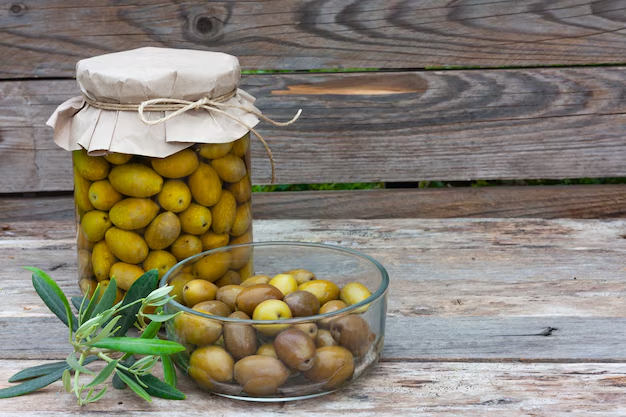Do Olives Last in the Refrigerator? A Comprehensive Guide
Olives are a beloved staple in a variety of cuisines worldwide, known for their unique flavor and versatility in dishes. But like all foods, they have a shelf life, and it's important to know how to store them properly to make the most of their savory goodness. Whether you're a casual olive eater or a culinary enthusiast, understanding the ins and outs of olive storage is key to keeping them fresh and delicious. In this guide, we'll explore whether olives go bad in the refrigerator, how to store them effectively, and some additional tips to enhance your olive experience.
Understanding Olive Shelf Life
What Makes Olives Different?
Olives are different from other fruits because they are often not consumed fresh. Instead, they are typically cured in brine or other solutions to become edible. This curing process can impact how they should be stored and how long they last.
- Cured in Brine: Brine-cured olives are soaked in a saltwater solution which not only preserves but also enhances their flavors.
- Oil-cured: These olives are rubbed with oil and allowed to cure naturally, leading to a distinctive texture and taste.
Storage Recommendations
The best way to store olives largely depends on how they're cured and packaged. In most cases, olives bought at the store will offer two forms:
- In Brine or Oil: Often sold in jars, these olives should be stored in a cool, dark place until opened. Once opened, place the jar in the refrigerator to maximize their shelf life.
- Dry-packed: These olives are less common and can be found in bulk bins without any liquid. They require different care to remain fresh, often involving airtight containers and refrigeration.
How Long Do They Last?
When olives are stored unopened in a cool, dark place, they can last for months past their best-by date. After opening:
- In the Refrigerator: Opened olives generally last around 7-10 days.
- In Brine: Can last a month or more if the brine covers them entirely and they are refrigerated.
- In Oil: Should be consumed quicker than brine-packed due to the potential for oil to become rancid, typically within a week or two.
Do Olives Go Bad in the Refrigerator?
Signs of Spoilage
While refrigeration extends the life of olives, they can still spoil. Here’s how to identify if olives have gone bad:
- Smell: Off-smelling or sour odors could suggest spoilage.
- Appearance: Mold growth or developing a slimy texture signals that they are no longer safe.
- Taste: A bitter, unpleasant, or off-taste should be avoided.
Factors Affecting Shelf Life
Several factors can influence how long olives remain fresh:
- Temperature Fluctuations: Frequent changes can speed up spoilage.
- Exposure to Air: Leaving the jar open can lead to contamination by bacteria and yeasts.
- Contamination: Using unclean utensils to take out olives can introduce elements that make them spoil faster.
Best Practices for Storing Olives
Maximizing Freshness
To keep your olives fresh and delectable, follow these steps:
- Always keep covered: Ensure olives remain submerged in their pack liquid (brine/oil), as this barrier prevents exposure to air.
- Use Clean Utensils: Implement a clean spoon or fork when removing olives from the jar, preventing cross-contamination.
- Seal Tightly: Once opened, reseal jars tightly or transfer to air-tight containers.
Consider Freezing
While unconventional, freezing can slow spoilage. However, the texture might change, making them less ideal for direct consumption. Instead, consider using frozen olives in cooked dishes where texture differences are less noticeable.
Exploring Olive Varieties and Their Storage Needs
Understanding different types of olives can enhance storage knowledge. Some common varieties include:
- Kalamata: Known for their dark purple color and almond shape, these olives hold up well under refrigeration once opened.
- Picholine: Green and small, these might be stored similar to brine-cured options.
- Castelvetrano: Sweet and buttery, preferably stored in the refrigerator for short durations.
Pairing and Culinary Uses
Olives are not only delicious on their own but can seriously elevate the taste of many dishes.
Pairings and Cooking Tips
- Cheese and Charcuterie: Perfect for platters, pair with cheeses like feta or goat for a savory contrast.
- Pasta and Salads: Add a handful of olives to a Greek salad or pasta dish for that extra punch of flavor.
- Pizzas and Tapenade: Create an olive tapenade as a spread or topping for dishes.
Handy Summary for Storing Olives
Here's a quick reference guide to ensure your olives stay fresh:
- 📦 Storage: Keep unopened olives in a cool, dark place; refrigerate once opened.
- 💧 Brine/Oil: Ensure olives remain submerged in their pack liquid.
- ⏰ Shelf Life: Consume opened, refrigerated olives within 1-2 weeks, depending on packaging and variety.
- 🚫 Avoid: Smell or slimy feel indicates spoilage - discard if noted.
Enhancing Your Olive Knowledge
By better understanding the conditions that lead to spoilage and proper storage techniques, you can maximize the shelf life and enjoyment of olives. With the added bonus of knowing these tips and tricks, you've got the tools to keep your favorite olives fresh and delicious, ready for use when culinary inspiration strikes.
This extensive exploration demonstrates that while olives can last for a significant time when stored appropriately, they eventually spoil and require attention to detail in handling. The insight into their storage and spoilage behaviors is sure to add value to your kitchen practices, ensuring delightful olive experiences from the jar to your plate.

